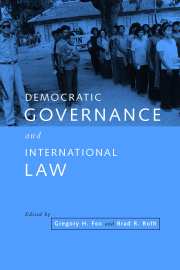Book contents
- Frontmatter
- Contents
- List of contributors
- List of acknowledgments
- Introduction: the spread of liberal democracy and its implications for international law
- PART I THE NORMATIVE FOUNDATIONS OF A RIGHT TO POLITICAL PARTICIPATION
- PART II DEMOCRACY AND INTER-STATE RELATIONS
- PART III DEMOCRACY AND THE USE OF FORCE
- PART IV DEMOCRATIZATION AND CONFLICTING IMPERATIVES
- 12 Intolerant democracies
- 13 Whose intolerance, which democracy?
- 14 Democratic intolerance: observations on Fox and Nolte
- 15 A defense of the “intolerant democracies” thesis
- 16 Democracy and accountability: the criss-crossing paths of two emerging norms
- PART V CRITICAL APPROACHES
- Index
16 - Democracy and accountability: the criss-crossing paths of two emerging norms
Published online by Cambridge University Press: 04 May 2010
- Frontmatter
- Contents
- List of contributors
- List of acknowledgments
- Introduction: the spread of liberal democracy and its implications for international law
- PART I THE NORMATIVE FOUNDATIONS OF A RIGHT TO POLITICAL PARTICIPATION
- PART II DEMOCRACY AND INTER-STATE RELATIONS
- PART III DEMOCRACY AND THE USE OF FORCE
- PART IV DEMOCRATIZATION AND CONFLICTING IMPERATIVES
- 12 Intolerant democracies
- 13 Whose intolerance, which democracy?
- 14 Democratic intolerance: observations on Fox and Nolte
- 15 A defense of the “intolerant democracies” thesis
- 16 Democracy and accountability: the criss-crossing paths of two emerging norms
- PART V CRITICAL APPROACHES
- Index
Summary
The blossoming of concern for human rights by a broad spectrum of States since the end of the Cold War has assumed both a proactive and reactive posture. On the one hand, governments around the world, responding to the desires of their people for a full participatory role in deciding their nation's future, have moved toward adoption of democratic forms of governance. At the same time, the resulting new regimes and their constituencies have been forced to reckon with the legacy of authoritarian systems or civil wars and to devise the proper way to hold accountable those who have violated human rights. Thus, demands for and attempts to create democracy and accountability have become central forces in our millennial era. Both developments constitute an attempt to deepen the meaning of human rights beyond the notion of protections from specific abuses, to include a system of governance that will prevent abuses in the future and that will effectively respond to those in the past.
By democracy, I mean, as do others in the volume, liberal or constitutional democracy – a political system with governments elected by popular majority, and with the rule of law enshrined to protect those not in the majority. Accountability refers to a process for holding individuals personally responsible for human rights abuses they have committed. These two trends, of course, are not merely political, but profoundly normative in two senses.
- Type
- Chapter
- Information
- Democratic Governance and International Law , pp. 449 - 490Publisher: Cambridge University PressPrint publication year: 2000
- 2
- Cited by



